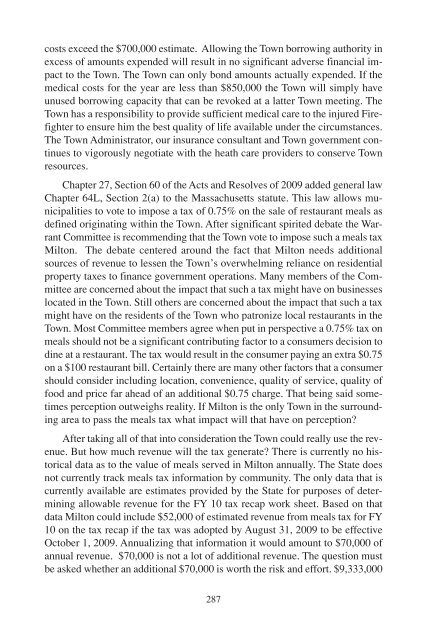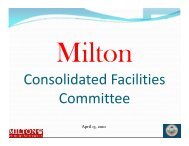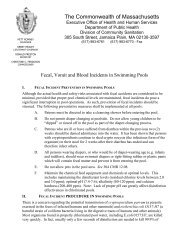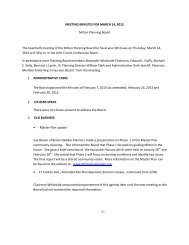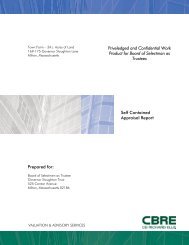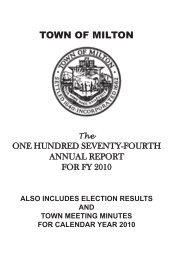2009 Annual Report.pdf - Town of Milton
2009 Annual Report.pdf - Town of Milton
2009 Annual Report.pdf - Town of Milton
Create successful ePaper yourself
Turn your PDF publications into a flip-book with our unique Google optimized e-Paper software.
costs exceed the $700,000 estimate. Allowing the <strong>Town</strong> borrowing authority in<br />
excess <strong>of</strong> amounts expended will result in no significant adverse financial impact<br />
to the <strong>Town</strong>. The <strong>Town</strong> can only bond amounts actually expended. If the<br />
medical costs for the year are less than $850,000 the <strong>Town</strong> will simply have<br />
unused borrowing capacity that can be revoked at a latter <strong>Town</strong> meeting. The<br />
<strong>Town</strong> has a responsibility to provide sufficient medical care to the injured Firefighter<br />
to ensure him the best quality <strong>of</strong> life available under the circumstances.<br />
The <strong>Town</strong> Administrator, our insurance consultant and <strong>Town</strong> government continues<br />
to vigorously negotiate with the heath care providers to conserve <strong>Town</strong><br />
resources.<br />
Chapter 27, Section 60 <strong>of</strong> the Acts and Resolves <strong>of</strong> <strong>2009</strong> added general law<br />
Chapter 64L, Section 2(a) to the Massachusetts statute. This law allows municipalities<br />
to vote to impose a tax <strong>of</strong> 0.75% on the sale <strong>of</strong> restaurant meals as<br />
defined originating within the <strong>Town</strong>. After significant spirited debate the Warrant<br />
Committee is recommending that the <strong>Town</strong> vote to impose such a meals tax<br />
<strong>Milton</strong>. The debate centered around the fact that <strong>Milton</strong> needs additional<br />
sources <strong>of</strong> revenue to lessen the <strong>Town</strong>’s overwhelming reliance on residential<br />
property taxes to finance government operations. Many members <strong>of</strong> the Committee<br />
are concerned about the impact that such a tax might have on businesses<br />
located in the <strong>Town</strong>. Still others are concerned about the impact that such a tax<br />
might have on the residents <strong>of</strong> the <strong>Town</strong> who patronize local restaurants in the<br />
<strong>Town</strong>. Most Committee members agree when put in perspective a 0.75% tax on<br />
meals should not be a significant contributing factor to a consumers decision to<br />
dine at a restaurant. The tax would result in the consumer paying an extra $0.75<br />
on a $100 restaurant bill. Certainly there are many other factors that a consumer<br />
should consider including location, convenience, quality <strong>of</strong> service, quality <strong>of</strong><br />
food and price far ahead <strong>of</strong> an additional $0.75 charge. That being said sometimes<br />
perception outweighs reality. If <strong>Milton</strong> is the only <strong>Town</strong> in the surrounding<br />
area to pass the meals tax what impact will that have on perception?<br />
After taking all <strong>of</strong> that into consideration the <strong>Town</strong> could really use the revenue.<br />
But how much revenue will the tax generate? There is currently no historical<br />
data as to the value <strong>of</strong> meals served in <strong>Milton</strong> annually. The State does<br />
not currently track meals tax information by community. The only data that is<br />
currently available are estimates provided by the State for purposes <strong>of</strong> determining<br />
allowable revenue for the FY 10 tax recap work sheet. Based on that<br />
data <strong>Milton</strong> could include $52,000 <strong>of</strong> estimated revenue from meals tax for FY<br />
10 on the tax recap if the tax was adopted by August 31, <strong>2009</strong> to be effective<br />
October 1, <strong>2009</strong>. <strong>Annual</strong>izing that information it would amount to $70,000 <strong>of</strong><br />
annual revenue. $70,000 is not a lot <strong>of</strong> additional revenue. The question must<br />
be asked whether an additional $70,000 is worth the risk and effort. $9,333,000<br />
287


